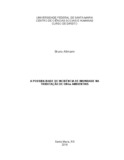| dc.contributor.advisor | Cezne, Andrea Nárriman | |
| dc.creator | Altmann, Bruno | |
| dc.date.accessioned | 2019-08-07T15:00:34Z | |
| dc.date.available | 2019-08-07T15:00:34Z | |
| dc.date.issued | 2018-06-09 | |
| dc.date.submitted | 2018 | |
| dc.identifier.uri | http://repositorio.ufsm.br/handle/1/17772 | |
| dc.description | This paper aims to verify the possibility of the incidence of constitutional tax immunity to environmental NGOs. This theme is underexplored by the doctrine, but of paramount importance for the life of every people. Non-governmental organizations working in the environmental area and the tax benefits guaranteed to them will be analyzed, from the point of view of their very important work in the defense of fundamental rights. For this, we will also analyze the constitutional immunities, to identify their real meaning and to verify who they protect. The hypothetical-deductive method will be used, aiming to confront the different positions on the subject, and, finally, verify the possibility of application of constitutional tax immunity to NGOs, analyzing legislation and doctrine. The procedures used will be historical, comparative and monographic. The work will be divided into two parts: the first analyzing tax immunities and fundamental rights, and the second part analyzing their impact on environmental NGOs | por |
| dc.description.abstract | This paper aims to verify the possibility of the incidence of constitutional tax immunity to environmental NGOs. This theme is underexplored by the doctrine, but of paramount importance for the life of every people. Non-governmental organizations working in the environmental area and the tax benefits guaranteed to them will be analyzed, from the point of view of their very important work in the defense of fundamental rights. For this, we will also analyze the constitutional immunities, to identify their real meaning and to verify who they protect. The hypothetical-deductive method will be used, aiming to confront the different positions on the subject, and, finally, verify the possibility of application of constitutional tax immunity to NGOs, analyzing legislation and doctrine. The procedures used will be historical, comparative and monographic. The work will be divided into two parts: the first analyzing tax immunities and fundamental rights, and the second part analyzing their impact on environmental NGOs | eng |
| dc.language | por | por |
| dc.publisher | Universidade Federal de Santa Maria | por |
| dc.rights | Acesso Aberto | por |
| dc.subject | Imunidade | por |
| dc.subject | Meio ambiente | por |
| dc.subject | Constituição | por |
| dc.subject | Direitos fundamentais | por |
| dc.subject | ONGs ambientais | por |
| dc.subject | Immunity | eng |
| dc.subject | Environment | eng |
| dc.subject | Constitution | eng |
| dc.subject | Fundamental rights | eng |
| dc.subject | Environmental NGOs | eng |
| dc.title | A possibilidade de incidência de imunidade na tributação de ONGs ambientais | por |
| dc.title.alternative | The possibility of incidence of tax immunity in the taxation of environmental NGOS | eng |
| dc.type | Trabalho de Conclusão de Curso de Graduação | por |
| dc.degree.local | Santa Maria, RS, Brasil | por |
| dc.degree.graduation | Direito | por |
| dc.description.resumo | Este trabalho tem por objetivo verificar a possibilidade de incidência de imunidade tributária constitucional às ONGs ambientais. Este é um tema pouco explorado pela doutrina, porém de suma importância para a vida de todas as pessoas. Serão analisadas as organizações não governamentais que atuam na área ambiental e os benefícios tributários garantidos a estas, sob o ponto de vista de seu importantíssimo trabalho na defesa dos direitos fundamentais. Para isto, analisaremos também as imunidades constitucionais, para identificar seu real significado e verificar a quem elas protegem. O método hipotético-dedutivo será utilizado, visando confrontar as diferentes posições sobre o tema, e, por fim, verificar a possibilidade de aplicação da imunidade tributária constitucional às ONGs, analisando-se legislação e doutrina. Os métodos de procedimento utilizados serão o histórico, o comparativo e o monográfico. O trabalho será dividido em duas partes: a primeira tratando das imunidades tributárias e direitos fundamentais, e a segunda parte tratando da sua incidência às ONGs ambientais. | por |
| dc.publisher.country | Brasil | por |
| dc.publisher.initials | UFSM | por |
| dc.subject.cnpq | CNPQ::CIENCIAS SOCIAIS APLICADAS::DIREITO | por |
| dc.publisher.unidade | Centro de Ciências Sociais e Humanas | por |


